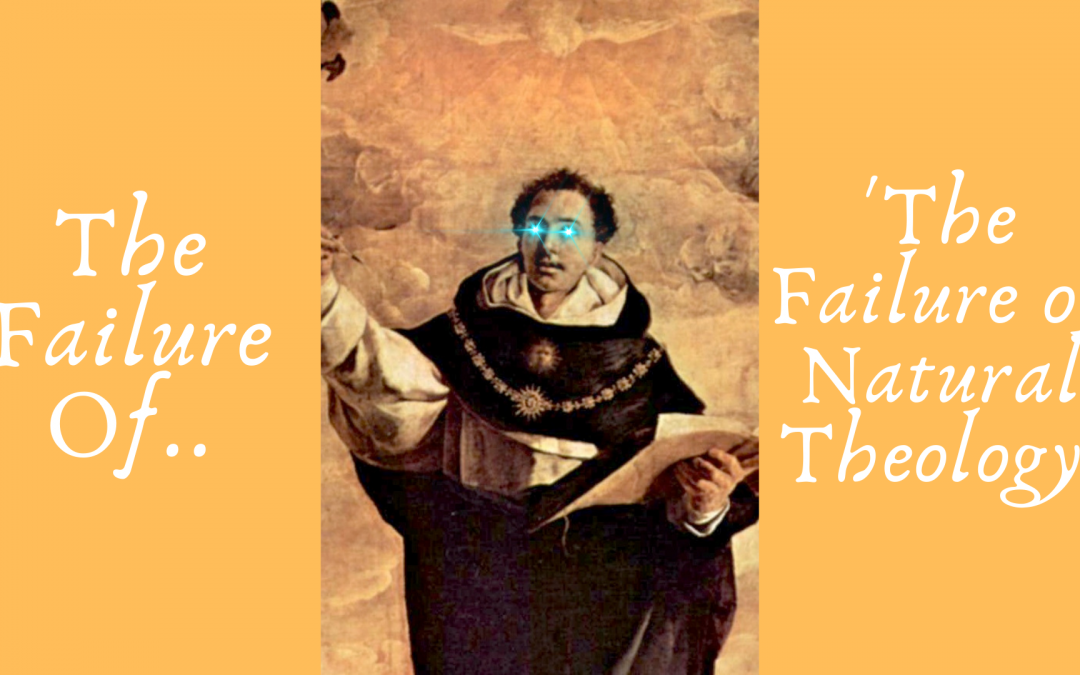With respect to the previous post, I’d say the main takeaway was this: Johnson implicated a want in God. A less archaic way of saying the same: God, thinks Johnson, is in need of motion in order to create the world. The belief in this divine need diminishes in no wise throughout the next three chapters, as we will see.
Before I get started, I would like to address those who have begun their criticisms by saying, “You haven’t read the whole book yet!” I answer—You haven’t read my whole review yet. So, what are you doing criticizing my work? My conscience is clear given where I’ve been with similar subject-matter in the past, and also coming from a Van Tillian background. Please, assess my review on its merits as I am attempting to do with Dr. Johnson’s book. As it is, there is nothing new under the sun, and this most certainly is not an original work. If you’ve read Van Til, Oliphint, and Frame you’ve already read Johnson’s book—a claim perhaps to be proven another day.
The following review will critically evaluate the next three chapters, chs. 4-6. I believe you will find that my criticisms of the first three chapters will hold by the time our evaluation of chs. 4-6 is complete. With that said, let’s get started—
The (Relevance?) of Pseudo-Dionysius’ Natural Theology
Johnson’s main point in writing this chapter is not to criticize natural theology or Thomas, but to present a survey of Dionysius’ natural theology. For this reason, I do not have many direct critiques of this chapter. But, in reading the following chapters, one gets the feeling Johnson was setting his readership up to accept a massive genetic fallacy. A genetic fallacy occurs when an argument (or something of the like) is rejected purely because of its source. It would be like someone denying 2+2=4 simply because Hitler once verbalized it in a speech. The validity of said equation does not rest upon Hitler. It is true regardless of Hitler’s character. In following chapters, though it be assumed, it doesn’t seem Johnson actually proves causal relation between Dionysius’ philosophical assumptions and terminology to that of Thomas’. I’m not saying there isn’t one, I just do not think Johnson succeeds in making that connection.
Assuming Johnson’s biographical, historical-philosophical and theological information is accurate, this is a somewhat useful chapter in understanding Dionysius’ thought. Yet, seeing as how this book is not purposed to evaluate and critique Dionysius, one has to wonder why it is in here, especially given the conjectural and spurious connections between Dionysius and Thomas in following chapters.
Because this chapter is more descriptive and not opinionated, I only have a single qualm. Johnson writes:
Dionysius, in his attempt to reconcile Neoplatonism with Christianity, claimed that he did not want to add or take away anything from the Scriptures. Concerning the Scriptures, he asserted, “We strive to preserve its treasure in ourselves without addition, diminution, or distortion” (DN. 2.3). Nevertheless, he completely undermined the objectivity and sufficiency of Scripture by reducing divine revelation to an analogical language that is essentially and completely symbolic: [The Scriptures] enwrapped spiritual truths in terms drawn from the world of sense, and super-essential truths in terms drawn from Being, clothing with shapes and forms things which are shapeless and formless, and by a variety of separable symbols, fashioning manifold attributes of the imageless and supernatural Simplicity” (DN. 1.4).
For those just tuning in, there are basically three species of language or predication: univocal, equivocal, and analogical. Univocal language is predication corresponding more directly to its subject. To that end, it comprehends (to one extent or another) that of which it speaks, i.e. “the circle is round.” The predication is proper to the subject, we might say. Equivocal language refers to a single predicate with diverse subjects, e.g. the trunk of an elephant vs. the trunk of a car. And analogical language predicates true things about the subject analogically, e.g. candle light is like sunlight (but the two are obviously not the same). Analogy communicates likeness.
Johnson has taken issue with symbolic language. Oddly enough, however, words themselves are symbolic notwithstanding. Francis Turretin writes, “words are the types (typoi) of things (Institutes, vol. 1, 1, I.).” Contrarily, Johnson implies there is some more direct mode of communication, entirely evasive of symbology or analogy. To jump ahead, he says of Thomas’ view, “Because there is no probation or gradation between the finite and the infinite, our communication of God… is at best metaphorical, if not altogether mystical (FNT. 177).” It is unclear how Johnson makes a distinction between analogical language on the one hand and metaphorical language on the other. He affirms Scripture uses analogical predication through and through, but he never seems to define its meaning in such a way as to distinguish it from metaphor or “mystical” language.
Johnson’s issue with Aquinas seems to be his (Aquinas’) reluctance to allege a comprehension of the infinite divine essence by finite, creaturely terminology. But this impossibility of finite comprehension of the infinite must be the case since that which is infinite cannot be piecemealed, quantified, or otherwise comprehended by finite creatures. A maxim popularized during the Reformation was, “finitum non capax infiniti,” the finite cannot comprehend the infinite. It was relevant especially to the Romish doctrine of transubstantiation. But, for our purposes here, we must affirm the same with regard to our knowledge of the divine essence. Thomas was right. We cannot know God in Himself because God in Himself is infinite. If we finite creatures could “get our arms around Him,” so to speak, God would not be infinite, and so God would not be God. As Turretin says, “finite and created [theology]… is made to travelers… (Institutes, vol. 1, 2, VI).” This is a reference to the Reformed scholastic division in theology: theology of the pilgrim (theologia viatorum), theology of beatitude (theologia beatorum), and theology of union (incarnate theology of Christ)(theologia unionis).
While much of Dionysius is brought forth here, and while I have no doubt Thomas drank deeply from him, it never becomes quite clear what the necessary link is between the two. Johnson appears as if he wants to implicate Thomas in Dionysius’ errors. But he never succeeds in showing where Thomas adopted Dionysis’ errors in the first place.
The Philosophical Theology of Thomas Aquinas
In ch. 5, there are some odd, one-off remarks made which makes me question some of Johnson’s presuppositions. I myself always tell members of our church, “The Christian ought always be in search of the truth.” My assumption, of course, is that all truth is God’s truth. He is the one who, after all, created the cosmos. Yet, Johnson appears uneasy at the prospect of appropriating all truth into the Christian faith, “And like Boethius, who sought to reconcile Aristotle, Plato, and Christ, Alber [the Great] believed that wherever truth is found, either in Aristotle or in Plato, it ought to be assimilated into Christianity (FNT, 96).” Assuming Johnson sees this as controversial, I could just ask, “Why?”
If God is responsible for all truth, would not all truth tell us more about God? The Second London Baptist Confession (1677), says, “the works of creation and providence do so far manifest the goodness, wisdom, and power of God (1.1).” Would it, thus, not follow that all truth in creation communicates something of God, and thus finds some place in our theology?
In this chapter, aside from likening the via negativa (apophaticism) to bad directions to one’s house, there are other issues. Continuing his assault on analogical language, which he calls metaphorical (for what explanation, we know not), he says, “our knowledge of God at best is only a symbolic representation of God (FNT, 106).” If language is just theology made explicit, we might follow Turretin at this juncture and respond, “All propositional knowledge and language is significant of that which it signifies. We have an ectypal not an archetypal theology. And thus, we know God in creature-mode.
On the very next page, Johnson begins comparing the Thomistic and Reformed position with Plato’s cave. “Our relationship with God,” he laments, “is based on knowledge, and this, based on a creative picture. It doesn’t matter if God can speak to us or not; we cannot rise above the cave that enslaves us (FNT, 107).” If by “creative picture” Johnson means a creaturely medium, then what Johnson bemoans as an intellectual handicap is prima facie true! The finite cannot comprehend the infinite, and for this reason revelation must be creaturely. I wonder if Johnson would recognize a distinction between God Himself and His revelation. If there is a distinction between the two, it would follow that revelation just is a creative picture of God, because it is creature rather than Creator. Yet, it nevertheless reveals the Creator accurately and sufficiently, albeit not in the way Johnson has hoped for. More on this when we get to ch. 9.
The Fatal Flaw
As with ch. 3, ch. 6 reveals a staggeringly unorthodox conception of the doctrine of God. This seems, once more, to result from Johnson’s bent against anything having to do with the operation of human reason in discerning the existence of God “by the things that are made (Rom. 1:20).” He asks, “Is philosophy—without the aid of revelation—even capable of leading rational people to the same God of natural and supernatural revelation (FNT, 114)?” The question is deficient. First, natural revelation is the object of natural knowledge/theology (what Johnson rightly places within philosophy). Second, that anyone believes natural theology is mutually exclusive to revelation is a canard I’ve already sought to reveal in my previous piece. The object of natural theology, even for Aquinas, are the things through which God revealed Himself, i.e. His works. Against the heretical Socinians, Turretin writes:
The orthodox, on the contrary, uniformly teach that there is a natural theology, partly innate (derived from the book of conscience by means of common notions [koinas ennoias]) and partly acquired (drawn from the book of creatures discursively)(Institutes, vol. 1, 1. 3. IV).
Later, Turretin asks, “Can the existence of God be irrefutably demonstrated against atheists? We affirm (Institutes, vol. 1, 3. 1. IV).” Under article VII of the same topic and question, he says, “The newness of the world with the commencement of motion and of time proves the necessary existence of God. For if the world began, it must necessarily have received its beginning from someone.” He places motion and time side-by-side, because as time is merely a measurement of change, it follows that that which moves is bound or measured by time, i.e. neither infinite nor eternal. After issuing proofs and discussing atheism, Turretin moves right into the locus of divine unity, following the same methodical order of Aquinas (who goes from the existence of God to God’s simplicity).
In identifying what Johnson calls “the fatal flaw,” he writes, “the fatal flaw of the philosophical theology of Thomas Aquinas is the foundation of his natural theology—divine immobility, the idea that God cannot move Himself (FNT, 114).” (And this is a bad thing!?) Johnson qualifies this statement with a footnote, saying, “To be more precise, I would say the fatal flaw lies in Aquinas’s unbiblical commitment that all knowledge begins and is confined to sense experience.” This warrants a bit of a rabbit trail before returning to immobility.
While Thomas believed all natural knowledge begins in the senses, he did not hold that it was “confined” to the senses. For Thomas, there are lower and higher appetites, sensitive and intellectual. Animals, for example, only have a sensitive soul. So, for animals, it would be right to say that their knowledge is confined to their senses. But this is not so with mankind. While knowledge begins in the senses, it does not end in the senses. “Now it is natural to man to attain to intellectual truths through sensible objects, because all our knowledge originates from sense (I, Q. 1, Art. 9).” Thus, the higher considerations of the intellect, while starting with the sensitive powers, certainly does not end in the sensitive powers. We often refer to this as inference. We infer higher truths through sensible objects. Modern empiricists, however, reduce man to beast in assuming all knowledge is confined to the sensitive appetite.
Now, because Johnson wants an immediate knowledge/revelation in man—un-infered or intuited through any kind of process or movement of the intellect—and because Johnson assumes a basic separation between the phenomena and the noumena, i.e. the sensible world cannot give us any sure knowledge of the noumena or God, he says, “No matter how hard Aquinas tried, he could not change the fact that divine immobility is incompatible with the God of the Bible (FNT, 115).” Immobility is a conclusion from the effect of God. But any discursion over God’s works, it is presupposed, cannot land man upon a true knowledge of God. He further says, “Aristotle presumed that what was true concerning motion in the observable realm would be true concerning motion (if it existed) in the unobservable realm (FNT, 116; emphasis added).”
Further elaboration on what he sees to be errors in Thomas’ reasoning, especially with respect to his five ways, Johnson writes, “But who is to say both non-motion and motion couldn’t exist in the Trinity? Seeing that God is triune, could not his essence be without cause, while motion eternally exists within the relationship of the three persons as they eternally communicate their love toward one another (FNT, 116)?” And, “Aristotle assumed that motion would apply the same to an autonomous being as it applies to contingent beings; Aquinas made this same assumption (FNT, 117).”
Johnson assumes Aristotle and Aquinas want to apply motion to God. But this is completely backwards. Whereas motion is creature, Thomas thought, it must be removed rather than applied to God. Thomas was remoting or negating motion—which he held to be nothing less than the actualization of a potential—from the divine essence. Motion, even if self-induced, would require God to be caused by something that is not God. There are basically three options:
- God is wholly identified with His movement, in which case there would be no place given for immutability.
- A part of God moves God, in which case God is composed and caused to be by said parts.
- God is both unmoved and moves Himself at the same time and in the same relationship, a violation of the law of contradiction, the commitment to which would render all predication unintelligible.
In the final analysis, neither of these three options are available to the Bible-believing (Mal. 3:6), orthodox Christian. And this means we must remote or remove motion from the divine essence altogether.
Furthermore, Turretin believed man was able to draw this conclusion through nature, as was above alluded. Nature reveals a God that is not mobile, but is the cause of all that is mobile. Johnson has committed himself to the same principle error of the process theologians. Rather than remoting creatureliness from God, Johnson wants to understand the essential Godhead in creaturely terms. Rather than understanding creaturely terms to be univocally inapplicable to the divine essence, Johnson falls headlong into affirming a creaturely attribute as proper to the divine essence, i.e. motion. This becomes clear in ch. 8, when he writes, “The Trinity is the only being (because he is both one and many) who can move himself ad intra… For something to be self-mobile, it has to be unmovable and movable at the same time (FNT, 161).”
Among other odd claims in the chapter, Johnson adds, “Natural theology must conclude that it is dependent on divine revelation to go any further than the knowledge of the existence of God (FNT, 118).” This statement comes within the context of Johnson denying accurate, logical inference from God’s effects to God. Just before it, he says, “Just because all contingent things in motion require an external cause does not mean that motion in God, if motion exists in God, requires an external cause.” And remember, he has already said, on p. 116, “Aristotle presumed that what was true concerning motion in the observable realm would be true concerning motion… in the unobservable realm.” Johnson thinks this is a faulty assumption. But if it is a faulty assumption, how could Scripture be any different? If Scripture falls within the “observable realm,” and if Scripture is creature, not Creator, then how could it map the unobservable realm? Kantian idealism has its consequences, and this is one of them. To arbitrarily except Scripture—which is creature—from this problem is to engage in special pleading.
Quoting from Herman Bavinck, he goes on to write, “We have no right… to apply the law of causality to such a first cause, and that we therefore cannot say anything specific about it (FNT, 117).” And he himself says immediately after, “The cosmological argument collapses because it jumps from physics to metaphysics, from science to philosophy, without having any epistemological warrant for such a leap.” There are a few important things to note at this point—
- If there is no epistemic warrant to conclude divine things from creaturely things, metaphysical things from physical things, etc., then how can Scripture, which is ontologically creature, communicate anything about divine things?
- The law of causality is but an extrapolation of the law of noncontradiction. Every effect must have a cause (contra John Stewart Mill who thought every thing must have a cause). That every effect needs a cause is an analytical statement because causality inheres in the very meaning of the term effect.
We must deny that God is an effect in every sense, because an effect just is that which has a cause. It would be contradictory to say of God, who is not an effect, that He is both uncaused and caused, or unmoved and moved. If this does not apply to our predication of God, it follows the laws of logic do not apply to our predication of God. And thus it would follow predication, biblical or otherwise, is entirely unintelligible. The way by which Johnson tries to reduce Aquinas’ arguments to absurdity actually results in reducing his own position to absurdity as well. For if we are without epistemic warrant to infer of heaven through what is made on earth, it follows that the Scriptures themselves, being creaturely, are altogether ineffectual.
Johnson goes on to ask several questions designed to illustrate alleged incoherence in the notion of an unmoved mover. He begins by saying, “So Aquinas, who sought to integrate the unmoved mover of Aristotle with the God of the Bible, had to explain how the unmoved mover can be the moving cause of the universe (FNT, 121).” Johnson is on a warpath against divine immutability, a la., immobility, and by extension, divine simplicity. He asks questions like, “How can the unmoved mover create anything new?” And, “If God is identical to his acts, how is God not one with his act of creating anything new?” Astounding is Johnson’s apparent assumption that these objections haven’t been discussed for the past 2,500 years. And he hardly interacts with the numberless explanations given, by manifold historical authors, on the point of immutability/immobility and its relation to creatio ex nihilo.
In terms of historical orthodoxy on the point of immobility, Benedict Pictet writes:
From the simplicity of God follows his immutability, which denotes nothing else than such a state of the divine essence and attributes, as is not subject to any variability. We argue this immutability… since whatever possesses all perfection, such is incapable of mutation (Post-Reformed Reformed Dogmatics, vol. 2, 312).
Richard Muller on the same says:
This assertion of immutability is to be understood absolutely denying every sort of mutation, including corruption, alteration, changes in knowing and willing, changes in and of attributes, and changes of place involving “local motion (PRRD, vol. 2, 313).”
Thomas Edwards states:
And so in all the Changes that happen in the World, in the several Ages of it, the case is the same. It is the permanent, and unchangeable Will of God, that he will act and influence on his Creatures, especially Men, as there is occasion. It is his immutable Decree that he will produce such and such alterations in the World, and at such a time. God himselfe [sic] is Immovable and Unchangable though he moveth and changeth all things. We move, not God. We are changed, not He (PRRD, vol. 2, 317).
Johnson’s burden, in this chapter and in others, was to show that mobility was not mutability. He never meets this burden, and as a result, onlookers are completely justified in implicating Johnson in the denial of classical and confessional immutability. And such a denial is contrary to orthodox Christianity, as Turretin writes, “With the orthodox, we maintain that every kind of immutability is to be ascribed to him both as to nature as to will (Intitutes, vol. 1, 3. 11. II).” Quoting Augustine, Turretin goes on, “Whatsoever is changed from the better for the worse, and from the worse for the better, is not God, because perfect virtue can neither change for the better, nor true eternity for the worse.” Also, Turretin denies Johnson’s assumption, that the act of creation requires change or motion in God, “Creation did not produce a change in God, but in creatures… It is one thing to change the will; another to will the change of anything. God can will the change of various things… without prejudice to the immutability of his will because because even from eternity he had decreed such a change.”
In short, if God moves, He is not God. Even if it is so-called “self-motion,” movement assumes a final cause, or that end toward which the object moves. This, even on self-movement, introduces contingency within the Godhead.
Conclusion
The rest of the chapter attempts to deconstruct Thomas’ proofs upon the faulty assumptions Johnson makes which we’ve already reviewed. There is much I could say in defense of Thomas, but in this review, I am not so much concerned to defend a man as I am to examine the integrity of Johnson’s views on natural theology in se and theology proper, both views of which I believe to be soul- and church-destroying.
In this part of the review, we’ve seen clearly Johnson’s affirmation of motion in God. And this, interestingly enough, is seemingly drawn from his rejection of the proofs. Johnson has rejected natural theology, or the first principles. Because of this, he’s landed squarely in a denial of divine immobility, and has rejected the unmoved mover, which has introduced contingency within the divine essence.
Again, Jeff, I pray you walk backwards.






